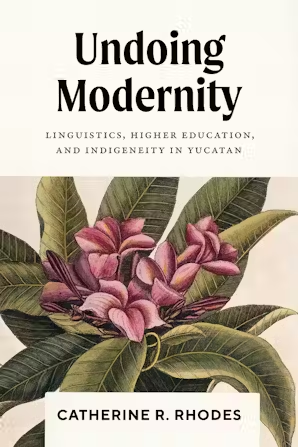Dr. Catherine Rhodes Publishes New Book "Undoing Modernity: Linguistics, Higher Education, and Indigeneity in Yucatan"
Departmental News
Posted: Jan 13, 2025 - 09:00am

Dr. Catherine Rhodes has published a new book Undoing Modernity: Linguistics, Higher Education, and Indigeneity in Yucatan with the University of Texas Press.
An ethnography of the decolonization of Maya-ness:
On the Yucatan Peninsula today, undergraduates are inventing a new sense of being Maya by studying linguistics and culture in their own language: Maya. In this bold theoretical intervention informed by ethnographic research, Catherine Rhodes argues that these students are undoing the category of modernity itself. Created through colonization of the Americas, modernity is the counterpart to coloniality; the students, Rhodes suggests, are creating decoloniality’s companion: “demodernity.”
Disciplines like linguistics, anthropology, history, and archaeology invented “the Maya” as an essentialized ethnos in a colonial, modern mold. Undoing Modernity follows students and their teachers as they upset the seemingly stable ethnic definition of Maya, with its reliance on a firm dichotomy of Maya and modern. Maya linguistics does not prove that Maya is modern but instead rejects the Maya-ness that modernity built, while also fostering within the university an intellectual space in which students articulate identity on their own terms. An erudite and ultimately hopeful work of interdisciplinary scholarship that brings linguistic anthropology, Mesoamerican studies, and critical Indigenous studies into the conversation, Undoing Modernity dares to imagine the world on the other side of colonial/modern ideals of Indigeneity.
Catherine R. Rhodes is an assistant professor of anthropology at the University of New Mexico. She is a coauthor of Migration Narratives: Diverging Stories in Schools, Churches, and Civic Institutions and associate producer of the ethnographic film Adelante.
On the Yucatan Peninsula today, undergraduates are inventing a new sense of being Maya by studying linguistics and culture in their own language: Maya. In this bold theoretical intervention informed by ethnographic research, Catherine Rhodes argues that these students are undoing the category of modernity itself. Created through colonization of the Americas, modernity is the counterpart to coloniality; the students, Rhodes suggests, are creating decoloniality’s companion: “demodernity.”
Disciplines like linguistics, anthropology, history, and archaeology invented “the Maya” as an essentialized ethnos in a colonial, modern mold. Undoing Modernity follows students and their teachers as they upset the seemingly stable ethnic definition of Maya, with its reliance on a firm dichotomy of Maya and modern. Maya linguistics does not prove that Maya is modern but instead rejects the Maya-ness that modernity built, while also fostering within the university an intellectual space in which students articulate identity on their own terms. An erudite and ultimately hopeful work of interdisciplinary scholarship that brings linguistic anthropology, Mesoamerican studies, and critical Indigenous studies into the conversation, Undoing Modernity dares to imagine the world on the other side of colonial/modern ideals of Indigeneity.
Catherine R. Rhodes is an assistant professor of anthropology at the University of New Mexico. She is a coauthor of Migration Narratives: Diverging Stories in Schools, Churches, and Civic Institutions and associate producer of the ethnographic film Adelante.
Catherine Rhodes takes a new theoretical approach to enduring questions of Mayan language revitalization, standardization, and pedagogy from a grounded ethnographic perspective. Undoing Modernity makes substantial contributions to transdisciplinary understandings of decolonization, Indigeneity, and critical efforts to configure unequal worlds differently.
— Brigittine M. French, Grinnell College, author of Maya Ethnolinguistic Identity: Violence, Cultural Rights, and Modernity in Highland Guatemala
This lively and detailed work raises the question of what it means to be Maya—and by extension, what it means to be Indigenous—through the process of undoing modernist approaches to language and culture. Throughout her deep ethnographic study of a Maya university in the Yucatan, Catherine Rhodes challenges us to reconsider the intellectual and institutional foundations that we often take for granted.
— Anna M. Babel, The Ohio State University, author of Between the Andes and the Amazon: Language and Social Meaning in Bolivia
